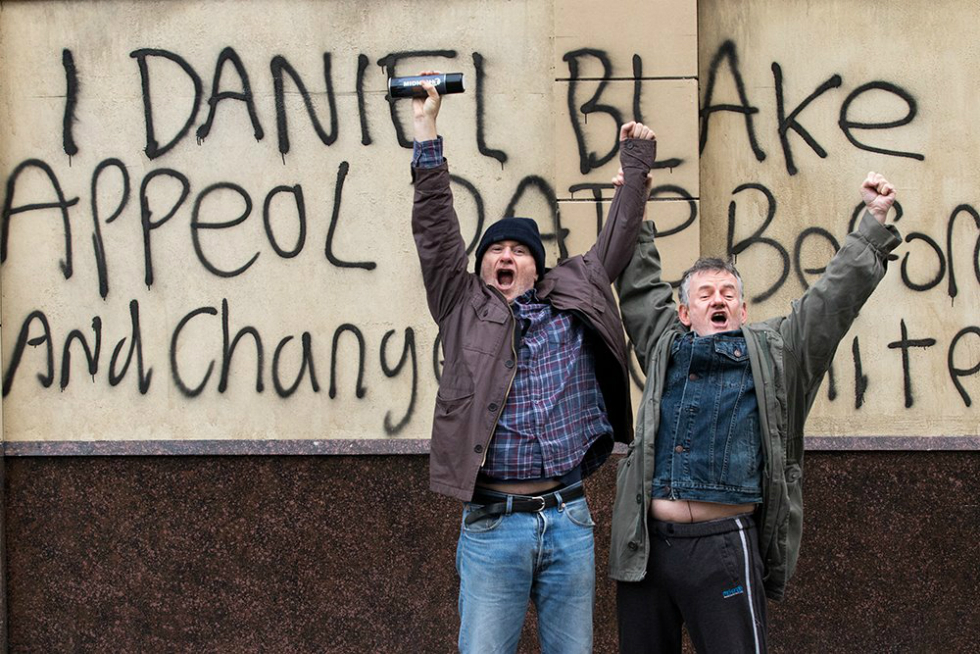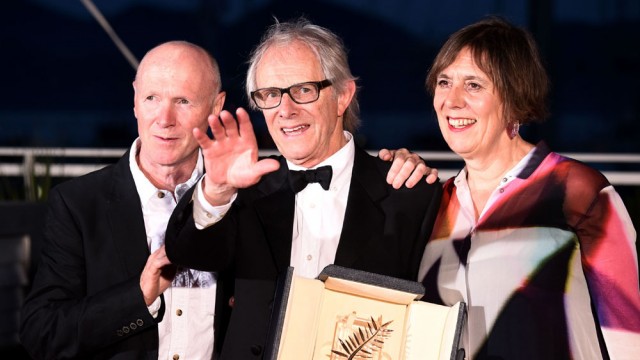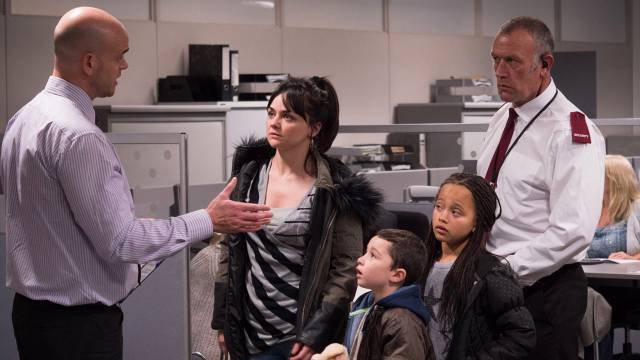“I would like people to feel angry and empowered” — The Big Interview: Rebecca O’Brien, Producer

Sinéad Nunes sits down with the I, Daniel Blake producer Rebecca O’Brien to discuss the film’s enormous success; being “outraged” by current politics; and what it’s like to be in a long-term collaborative relationship with director Ken Loach…
Ken Loach’s much-anticipated, Palme d’Or-winning, Cannes-total-standing-ovation-inducing realist drama I, Daniel Blake hit cinemas last month and has since been a hit at the UK box office. Telling the story of one man — the eponymous “everyman” — whose impossible struggle to navigate the benefit system after a serious heart attack, Loach’s latest is brutally and beautifully raw, highlighting the bureaucratic injustices that keep society’s poor and vulnerable disadvantaged.
We met with the film’s producer, and long-term collaborator with Loach, Rebecca O’Brien. The pair have worked on sixteen films together since 1988, including The Wind That Shakes the Barley (2006), Land and Freedom (1995) and My Name is Joe (1998). The common theme? Politics.
The Double Negative: You and Ken have worked on so many projects together. What made you want to get involved in this one?
Rebecca O’Brien: As soon as I read the script, I thought, this is just so important — we need to make it now. Ken’s style is realist fiction, and that’s why the film reads more like a documentary than a drama — because this, these situations, are real. The film sheds light on some enormous issues, and worryingly, there are parallels with countries across Europe too. Most cultures have this hideous bureaucracy that viewers identify with, so people everywhere we’ve shown it so far feel this film is about them.
I also liked the small scale and simplicity of the film; two central characters, three key locations, which was reflected in the shoot. Everything you see on screen exists within walking distance, mirroring this idea of a cross-continental sense of community.
How relevant is the film right now, given the current political climate in the UK?
I, Daniel Blake is even more urgent now, than when I first saw the script in May 2015. So many people know Daniel Blake, or they know Daniel Blake’s brother, or they are Daniel Blake, and this is happening to more people than we thought. Individuals experiencing these wrongs are just too isolated to be heard.

The research process for this film was intense, and what we’ve uncovered is just the tip of the iceberg. We met a lot of people before, during, and after the script was being written, whose stories have been woven together to concoct this drama, and many people involved in the project have had personal experiences of what Daniel and the other characters are going through, which made the shoot a really cathartic process.
And what of the timing, alongside the Labour Leadership election?
There are real parallels here between what we are showing in the film, and what Labour Leader Jeremy Corbyn is fighting for. The film is a campaigning tool for the Left; drama can be more powerful than documentary, and has the ability to open people’s eyes to the realities of what’s actually going on.
This is even more important given the recent behaviour of the centre-right press. I’ve been truly shocked at how the media has been vilifying Corbyn over recent months, but every put-down in the media has made him stronger, and inspired more people to sign up to support him, so now the press and government have to take notice. The Labour Party is the biggest party in Europe right now, so there’s a glimmer of hope that changes can be made, even under the “compassionate Conservatism” of Theresa May (which is a bit like a unicorn really; everyone’s heard of it, but no one’s seen it!).

You’ve worked with Ken for a long time now. What’s that like and how has your process changed over the years?
Ken is a thoughtful, funny, and serious man. He’s thorough, and always concerned with the details, and he’s evolved a style of filmmaking that I really like. I’ve always been political and left wing in my views, and my morals have strengthened as I’ve grown and learned what politics means, and got more outraged by what’s happening in the world, so working on this latest project with Ken has been a real honour.
What do you want audiences to take away from the film?
Working on this film has felt different to our previous collaborations, and that’s been reproduced in the way we’ve staggered the release; with this intense programme of public and community screenings ahead of the general release date. The whole point has been to get people who wouldn’t normally have the chance to see the film, and after seeing it, I would like people to feel angry and empowered enough to want to campaign to get rid of this ridiculous government, and change the systems we have in place.
We’ve already had such a positive and energetic response, I hope it inspires people to act, and do something. Someone at an event last week even told me that seeing the film made them re-think where they put their “cross” on the ballot box next time, and that’s the sort of difference we want to make.
Sinéad Nunes
I, Daniel Blake is now showing nationwide. Can’t find it in your area? Contact your local cinema or set up your own screening via the website
This is an extended version of an interview which appears in HELP, a zine created to promote the film. Pick up your copy for free at cinemas across the North West
Images: all stills from I, Daniel Blake, courtesy the filmmakers. Centre: Producer Rebecca O’Brien (right) with Ken Loach (centre) at Palme D’Or Award photocall, 69th Cannes Film Festival, France, 22 May 2016
Watch Ken Loach’s documentary on Jeremy Corbyn here





